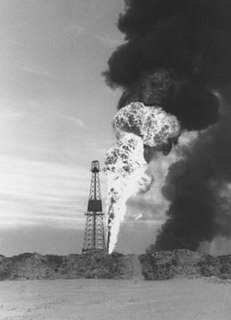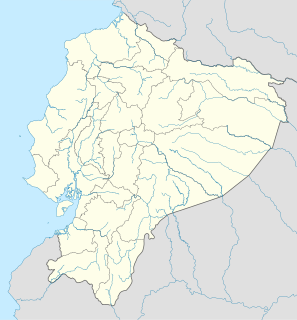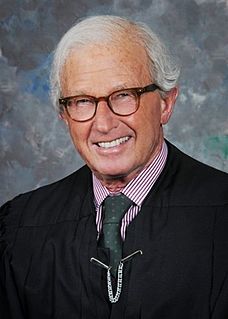The National Energy Program (NEP) was an energy policy of the Canadian federal government from 1980 to 1985. Created under the Liberal government of Prime Minister Pierre Trudeau by Energy Minister Marc Lalonde in 1980, the program was administered by the Department of Energy, Mines and Resources. Introduced following the oil crises and stagflation of the 1970s, the NEP proved to be a highly controversial policy initiative that pitted centralized economic nationalism and federal aspirations of energy self-sufficiency against provincial jurisdiction with hundreds of billions of dollars in oil revenue at stake. The result was a dispute that sparked intense opposition and anger in Canada's West, particularly in Alberta, and the rise of the Reform Party, a development that would shape Canadian politics for years to come.

Imperial Oil Limited is a Canadian petroleum company. It is Canada's second-biggest integrated oil company. ExxonMobil has a 69.6 percent ownership stake in the company. It is a significant producer of crude oil, diluted bitumen and natural gas, Canada's major petroleum refiner, a key petrochemical producer and a national marketer with coast-to-coast supply and retail networks. It supplies Esso-brand service stations.
William Alexander Stevenson was a Puisne Justice of the Supreme Court of Canada from 1990 to 1992.

Petroleum production in Canada is a major industry which is important to the economy of North America. Canada has the third largest oil reserves in the world and is the world's fourth largest oil producer and fourth largest oil exporter. In 2019 it produced an average of 750,000 cubic metres per day (4.7 Mbbl/d) of crude oil and equivalent. Of that amount, 64% was upgraded and non-upgraded bitumen from oil sands, and the remainder light crude oil, heavy crude oil and natural-gas condensate. Most of Canadian petroleum production is exported, approximately 600,000 cubic metres per day (3.8 Mbbl/d) in 2019, with 98% of the exports going to the United States. Canada is by far the largest single source of oil imports to the United States, providing 43% of US crude oil imports in 2015.

Canada's oil sands and heavy oil resources are among the world's great petroleum deposits. They include the vast oil sands of northern Alberta, and the heavy oil reservoirs that surround the small city of Lloydminster, which sits on the border between Alberta and Saskatchewan. The extent of these resources is well known, but better technologies to produce oil from them are still being developed.

The Canadian petroleum industry arose in parallel with that of the United States. Because of Canada's unique geography, geology, resources and patterns of settlement, however, it developed in different ways. The evolution of the petroleum sector has been a key factor in the history of Canada, and helps illustrate how the country became quite distinct from her neighbour to the south.

Canada has access to all main sources of energy including oil and gas, coal, hydropower, biomass, solar, geothermal, wind, marine and nuclear. It is the world's second largest producer of uranium, third largest producer of hydro-electricity, fourth largest natural gas producer, and the fifth largest producer of crude oil. In 2006, only Russia, the People's Republic of China, the United States and Saudi Arabia produce more total energy than Canada.
Bowoto v. Chevron Corp. was a lawsuit against Chevron Nigeria Ltd., a subsidiary of Chevron USA, which went to trial in 2008 in the United States District Court for the Northern District of California. The plaintiffs, Nigerian citizens who had been injured during or who had survived human rights violations perpetrated by Nigerian military personnel, alleged that the Chevron subsidiary backed the military action and that the parent company thus should bear liability in US courts for the resultant fallout. The suit was decided on December 1, 2008, when nine jurors unanimously agreed Chevron was not liable for any of the numerous allegations. Judgment was entered the next day, officially exonerating Chevron.

Canada's early petroleum discoveries took place near population centres or along lines of penetration into the frontier.

Natural gas has been used almost as long as crude oil in Canada, but its commercial development was not as rapid. This is because of special properties of this energy commodity: it is a gas, and it frequently contains impurities. The technical challenges involved to first process and then pipe it to market are therefore considerable. Furthermore, the costs of pipeline building make the whole enterprise capital intensive, requiring both money and engineering expertise, and large enough markets to make the business profitable.

Francis Murray Patrick "Frank" McMahon was a Canadian oilman best known as the founder and first chairman of Westcoast Transmission Co. Ltd. whom the July 15, 1957 issue of TIME magazine called "The man who did the most to open up northwest Canada's wilderness—and convince oilmen of its treasures."

Leduc No. 1 was a major crude oil discovery made near Leduc, Alberta, Canada on February 13, 1947. It provided the geological key to Alberta's most prolific conventional oil reserves and resulted in a boom in petroleum exploration and development across Western Canada. The discovery transformed the Alberta economy; oil and gas supplanted farming as the primary industry and resulted in the province becoming one of the richest in the country. Nationally, the discovery allowed Canada to become self-sufficient within a decade and ultimately a major exporter of oil.

The Lago Agrio oil field is an oil-rich area near the city of Nueva Loja in the province of Sucumbíos, Ecuador. It is located in the Western Oriente Basin. The site's hydrocarbon-bearing formations are the Cretaceous Napo and Hollin formations. Oil was discovered in the area in 1960s. The Lago Agrio field is known internationally for the serious ecological problems that oil development has created there, including water pollution, soil contamination, deforestation and cultural upheaval. Located in Cofan territory near the Colombian border, it is one of twelve production areas that developed when Ecuador began to export petroleum.

Martin Leach-Cross Feldman is a United States District Judge of the United States District Court for the Eastern District of Louisiana.

Amazon Watch is a nonprofit organization founded in 1996, and based in Oakland, California, it works to protect the rainforest and advance the rights of indigenous peoples in the Amazon Basin. It partners with indigenous and environmental organizations in Ecuador, Peru, Colombia and Brazil in campaigns for human rights, corporate accountability and the preservation of the Amazon's ecological systems.
The civil and criminal proceedings stemming from the explosion of Deepwater Horizon and the resulting massive oil spill in the Gulf of Mexico began shortly after the April 20, 2010 incident and have continued since then. They have included an extensive claims settlement process for a guilty plea to criminal charges by BP, and an ongoing Clean Water Act lawsuit brought by the U.S. Department of Justice and other parties.
Hornbeck Offshore Services v. Salazar is an ongoing case in United States federal court. In the wake of the Deepwater Horizon explosion and the subsequent oil spill, the U.S. Department of the Interior issued a six-month moratorium on exploratory drilling in deep water. Plaintiffs filed suit challenging the moratorium.

Eng Foong Ho v. Attorney-General is the name of two cases of the Singapore courts, a High Court decision delivered in 2008 and the 2009 judgment by the Court of Appeal. The main issue raised by the case was whether the Collector of Land Revenue had treated the plaintiffs, who were devotees of the Jin Long Si Temple, unequally by compulsorily acquiring for public purposes the land on which the temple stood but not the lands of a Hindu mission and a Christian church nearby. It was alleged that the authorities had acted in violation of Article 12(1) of the Constitution of the Republic of Singapore, which guarantees the rights to equality before the law and equal protection of the law.
Orphan wells in Alberta Canada refer to oil or gas well sites that have been permanently taken out of production that does not have any party legally or financially responsible to deal with decommissioning and reclamation obligations. By February 2018, there were 1,800 orphan wells that had been licensed by the Alberta Energy Regulator (AER) with combined liabilities of over $110 million. Oil and gas industry companies have asset retirement obligations (ARO), a legal obligation associated with the retirement of its operations. According to the National Observer, by January 2019, there were about "80,000 inactive wells around Alberta".

Bank of Ireland v O'Donnell & ors[2015] IESC 90 is an Irish Supreme Court case that centred around whether the appellants had any right or capacity to bring a motion before the court. They wanted to seek an order of a stay on Mr Justice McGovern's order dated 24 July 2014. In their appeal, they referred to the principle of objective bias and Mr Justice McGovern's refusal to recuse himself. The Supreme Court rejected the application for a stay and held that the law regarding objective bias was clearly stated in the lower court.









